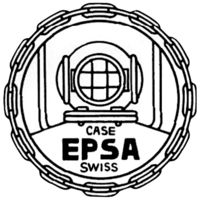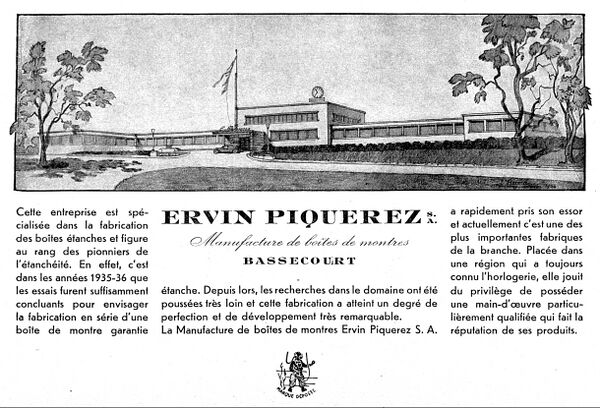EPSA: Difference between revisions
| (4 intermediate revisions by the same user not shown) | |||
| Line 11: | Line 11: | ||
During World War I the Piquerez factories focused on the manufacture of munitions, and Ervin Piquerez died suddenly on July 7, 1921 and his factory was closed. Arthur Piquerez too was unpopular with his customers and suffering after the war. | During World War I the Piquerez factories focused on the manufacture of munitions, and Ervin Piquerez died suddenly on July 7, 1921 and his factory was closed. Arthur Piquerez too was unpopular with his customers and suffering after the war. | ||
==Piquerez and Frésard== | ==Piquerez, Ruedin, and Frésard== | ||
:See Also: [[Georges Ruedin SA]] | |||
The sudden death of Ervin Piquerez in [[1921]] left his sons Camille (1901-1963) and Ervin (1909-1971) to build their own lives from scratch. Camille started a factory to make bicycle frames in [[1924]], and soon found success with his young brother Ervin in charge of production starting in [[1929]]. In 1939, Piquerez et Cie SA was the largest company in Bassecourt with 165 workers. | |||
The | The watch case factory was taken over by [[Georges Ruedin-Mathez]] of the [[Reconvilier Watch Company]], a major client, in partnership with [[Albert Jaquat]]. They created a new watch case factory, called [[Jaquat & Ruedin]] and managed by [[Georges Ruedin|Ruedin's son, also named Georges]]. The firm, renamed [[Georges Ruedin SA]], would remain a major competitor for the Piquerez family for the rest of the 20th century. Ultimately it was the Ruedin factory that became the key case supplier to the [[Swatch Group]] rather than Piquerez. | ||
But Ervin Piquerez wanted to return to the family's historic focus on the manufacture of watch cases. In [[1935]], he was hired as workshop manager by Léon Frésard (1889-1936) who would become his father in law when he married Eline Frésard (1915-) the following year. But Léon Frésard died suddenly, with his daughters Denise Frésard and Eline Piquerez-Frésard inheriting it. They split the company a few years later, with Denise's half continuing as Léon Frésard SA under her husband Georges Ceppi and the other half being taken over by Eline and her husband Ervin Piquerez. | But Ervin Piquerez wanted to return to the family's historic focus on the manufacture of watch cases. In [[1935]], he was hired as workshop manager by Léon Frésard (1889-1936) who would become his father in law when he married Eline Frésard (1915-) the following year. But Léon Frésard died suddenly, with his daughters Denise Frésard and Eline Piquerez-Frésard inheriting it. They split the company a few years later, with Denise's half continuing as Léon Frésard SA under her husband Georges Ceppi and the other half being taken over by Eline and her husband Ervin Piquerez. | ||
| Line 22: | Line 24: | ||
Following World War II, E. Piquerez SA became one of the largest companies in the northern Bernese Jura. EPSA cases were used by many Swiss firms, including [[Omega]], [[Tissot]], [[Longines]], and others. | Following World War II, E. Piquerez SA became one of the largest companies in the northern Bernese Jura. EPSA cases were used by many Swiss firms, including [[Omega]], [[Tissot]], [[Longines]], and others. | ||
EPSA registered the Compressor trademark in [[1955]] as the dive watch fad was still on the horizon. The company registered Supercompressor in [[1960]]. | |||
Erwin Piquerez died on January 13, [[1971]] at the age of 62 following an operation in a Basel clinic. By this point EPSA achieved annual sales of 30 million francs and employed 650 workers. His three sons continued to run the factory after his death. | Erwin Piquerez died on January 13, [[1971]] at the age of 62 following an operation in a Basel clinic. By this point EPSA achieved annual sales of 30 million francs and employed 650 workers. His three sons continued to run the factory after his death. | ||
[[File:Adi-001 1945 016 0275 Ervin Piquerez Ad.jpg|thumb|600px|This 1945 ad shows the E. Piquerez factory in Bassecourt]] | [[File:Adi-001 1945 016 0275 Ervin Piquerez Ad.jpg|center|thumb|600px|This 1945 ad shows the E. Piquerez factory in Bassecourt]] | ||
==Piquerez Bourquard SA== | ==Piquerez Bourquard SA== | ||
Latest revision as of 20:05, 6 July 2024

Ervin Piquerez SA (EPSA), also spelled Erwin, was a watch case manufacturer in Bassecourt. The company was established in 1939, incorporated in 1942, and bankrupt in 1991.
The Piquerez Family
The Piquerez family came from the village of Epiquerez in Clos du Doubs, with four generations involved in watchmaking, notably watch cases. Camille Piquerez (1835-1908) was a farmer who had a small watch case fitting workshop before moving to Saint-Ursanne in 1875. Attracted by the new Delémont-Porrentruy railway and the hydraulic power of the Doubs river, Camille was unable to grow production enough to meet his debts and was bankrupt in January of 1884.
Camille's oldest son, Arthur Piquerez (1859-1943) took over the workshop and developed manufacturing with the help of his wife, Thékla née Homberger. Arthur left in 1905 after the couple divorced, leaving the factory to his sons Emile and Arthur. The business, now in her name, grew to become Thecla SA in 1920, a metal stamping business that lasted through the 20th century. Her son Emile (1888-1949) founded another company, Técalemit, in Paris in 1921 and this business also became a lasting success. Arthur took over another watch case maker, Girardin, in 1905 as A. Piquerez.
Two other sons of Camille Piquerez, Gustave (1864-1931) and Ervin (1869-1921), moved to Bassecourt, where they founded the firm Piquerez Frères in 1886. The company was focused on the manufacture of watch cases and benefited from the presence of the railway and hydraulic power, like their father, but also from local watch production. Other local firms included dial maker Frédéric Imhof and toolmaker Scheffer Frères et Cie in nearby Courfaivre, which became Condor SA. In 1898, Ervin Piquerez took over the assets and liabilities of the firm in his own name.
During World War I the Piquerez factories focused on the manufacture of munitions, and Ervin Piquerez died suddenly on July 7, 1921 and his factory was closed. Arthur Piquerez too was unpopular with his customers and suffering after the war.
Piquerez, Ruedin, and Frésard
- See Also: Georges Ruedin SA
The sudden death of Ervin Piquerez in 1921 left his sons Camille (1901-1963) and Ervin (1909-1971) to build their own lives from scratch. Camille started a factory to make bicycle frames in 1924, and soon found success with his young brother Ervin in charge of production starting in 1929. In 1939, Piquerez et Cie SA was the largest company in Bassecourt with 165 workers.
The watch case factory was taken over by Georges Ruedin-Mathez of the Reconvilier Watch Company, a major client, in partnership with Albert Jaquat. They created a new watch case factory, called Jaquat & Ruedin and managed by Ruedin's son, also named Georges. The firm, renamed Georges Ruedin SA, would remain a major competitor for the Piquerez family for the rest of the 20th century. Ultimately it was the Ruedin factory that became the key case supplier to the Swatch Group rather than Piquerez.
But Ervin Piquerez wanted to return to the family's historic focus on the manufacture of watch cases. In 1935, he was hired as workshop manager by Léon Frésard (1889-1936) who would become his father in law when he married Eline Frésard (1915-) the following year. But Léon Frésard died suddenly, with his daughters Denise Frésard and Eline Piquerez-Frésard inheriting it. They split the company a few years later, with Denise's half continuing as Léon Frésard SA under her husband Georges Ceppi and the other half being taken over by Eline and her husband Ervin Piquerez.
E. Piquerez SA
Ervin Piquerez established his own namesake watch case manufacturing business in 1939 based on his wife's inheritance. This became Ervin Piquerez SA on December 24, 1942. He remained the sole board member of the company with Robert Bourgnon acting as director and his sister Olga Eichenberger-Piquerez as power of attorney.
Following World War II, E. Piquerez SA became one of the largest companies in the northern Bernese Jura. EPSA cases were used by many Swiss firms, including Omega, Tissot, Longines, and others.
EPSA registered the Compressor trademark in 1955 as the dive watch fad was still on the horizon. The company registered Supercompressor in 1960.
Erwin Piquerez died on January 13, 1971 at the age of 62 following an operation in a Basel clinic. By this point EPSA achieved annual sales of 30 million francs and employed 650 workers. His three sons continued to run the factory after his death.

Piquerez Bourquard SA
In 1984 a new company called Piquerez Bourquard SA was created, merging Ervin Piquerez SA and their Boécourt-competitor, La Générale. Production was concentrated at the EPSA factory in Bassecourt, with 200 people continuing to produce watch cases there while another 100 lost their jobs. The company was supported by the Banque cantonale du Jura and the Geneva venture capital company Gesplan SA.
The majority of shares in Piquerez Bourquard was taken over by Ascot Quartz Uhren by 1989.
In 1991 an agreement was reached to re-open the E. Piquerez factory in Bassecourt. Eric Monnier, a manufacturer of high-end watch cases in La Chaux-de-Fonds, reached an agreement with the Banque cantonale du Jura to purchase of buildings and real estate of the company, with the intention of re-hiring 60 workers to produce watch cases there again. The company would be called Nouvelle Piquerez SA.